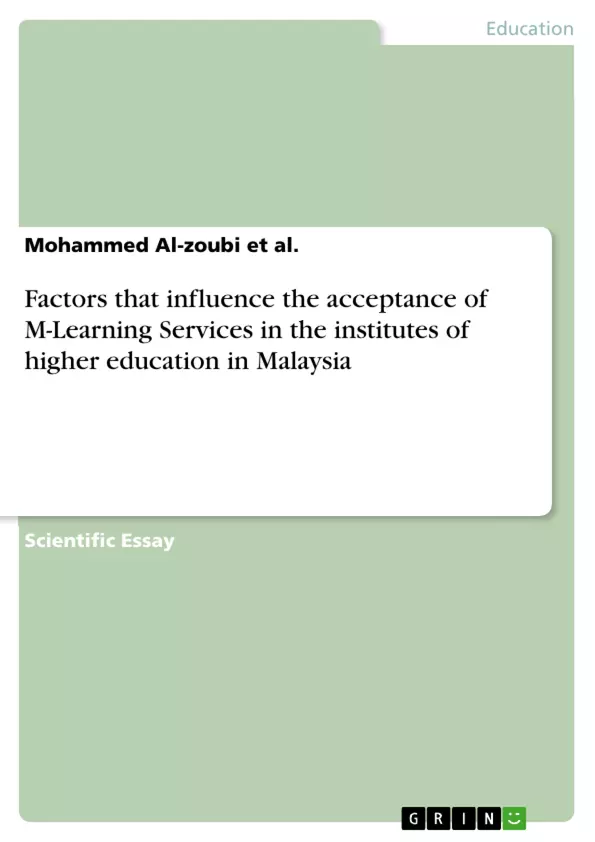M-learning is a new education channel that universally assists people in acquiring knowledge and skill via the use of mobile technologies. This study attempts to create a theoretical model, in which student acceptance of Mobile learning implementation in the three Islamic universities in Malaysia are explained and predicted. The model expands the belief concept in Technology Acceptance Model (TAM) and Innovation Diffusion Theory (IDT) by including one more constructs namely, service quality.
Inhaltsverzeichnis (Table of Contents)
- I. INTRODUCTION
- II. THEORETICAL FRAMEWORK
- A. Technology Acceptance Model (TAM)
- B. Innovation Diffusion Theory (IDT)
- C. INTEGRATION OF TAM & IDT THEORIES
- III. RESEARCH MODEL FACTORS
- 1. Service Quality
- IV. RESEARCH HYPOTHESES
Zielsetzung und Themenschwerpunkte (Objectives and Key Themes)
This study aims to develop a theoretical model to explain and predict student acceptance of mobile learning implementation in Islamic universities in Malaysia. It expands the belief concept in the Technology Acceptance Model (TAM) and Innovation Diffusion Theory (IDT) by incorporating the additional construct of service quality.
- Student acceptance of mobile learning services
- Factors influencing m-learning acceptance in higher education
- Integration of TAM and IDT theories
- Service quality dimensions in the context of m-learning
- Development of a Mobile Learning Acceptance Model
Zusammenfassung der Kapitel (Chapter Summaries)
- Introduction: This chapter discusses the importance of studying factors that influence student acceptance of mobile learning services in Malaysian universities. It highlights the need for understanding these factors before implementing m-learning systems to ensure effective use and acceptance.
- Theoretical Framework: This chapter reviews two well-established models of adoption and intention, namely the Technology Acceptance Model (TAM) and the Innovation Diffusion Theory (IDT). It explores the components and key constructs of both models and their relevance to m-learning adoption.
- Integration of TAM & IDT Theories: This chapter emphasizes the strong theoretical foundation provided by TAM and IDT for studying electronic commerce and internet application adoption. It also highlights the similarities between the two models and discusses studies that have combined them to explain user behavior.
- Research Model Factors: This chapter delves into the concept of service quality in the context of m-learning. It examines different dimensions of service quality, including accessibility, interface design, reliability and response, content quality, personalization, and security and privacy.
Schlüsselwörter (Keywords)
The key focus areas of this study are student acceptance, mobile learning, m-learning, higher education, Malaysia, Islamic universities, Technology Acceptance Model (TAM), Innovation Diffusion Theory (IDT), service quality, theoretical model, and Mobile Learning Acceptance Model.
Frequently Asked Questions
What is M-Learning?
M-learning (mobile learning) is a channel that allows people to acquire knowledge and skills using mobile technologies and wireless networks.
Which theoretical models are used in this study?
The study integrates the Technology Acceptance Model (TAM) and the Innovation Diffusion Theory (IDT) to explain student behavior.
What additional factor was added to the model?
The researchers added 'service quality' as a crucial construct to predict the acceptance of mobile learning services.
Where was the study conducted?
The research focused on students at three Islamic universities in Malaysia.
What are the dimensions of service quality in m-learning?
Key dimensions include accessibility, interface design, reliability, content quality, personalization, and security/privacy.
- Citar trabajo
- Mohammed Al-zoubi et al. (Autor), 2015, Factors that influence the acceptance of M-Learning Services in the institutes of higher education in Malaysia, Múnich, GRIN Verlag, https://www.grin.com/document/287714



